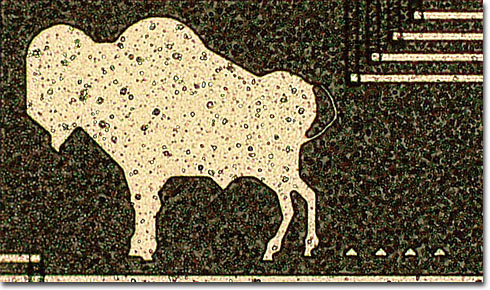More Buffalo Chips (Darkfield)
|
We were alerted to this Hewlett-Packard buffalo chip by Jon Singer of the Joss Research Institute, who also loaned us a copy of the integrated circuit. Jon tells us that the four tiny "chips" behind the buffalo were added one at a time when the mask was redesigned. We suspect, then, that this chip is revision number four. Although we originally didn't know the function of this chip (but see the next paragraph), it is the same one that sports the "I Love Hewlett-Packard" artwork. Lou Scheffer, who worked for Hewlett-Packard in Loveland, Colorado from 1975 to 1977, tells us that the chip is a HP 3582a, an audio frequency digital spectrum analyzer. This project had the code name Buffalo, which stood for "Barely Usable Fast Fourier Analyzer Like Object" (what a name!). The chip became known among the designers as the Buffalo Chip. Normally a buffalo chip refers to the dung deposited by the buffalo from the large amount of grass the animal consumes. The layout department engineers working on the project (Kathy Mazzotta, Yvette Norman, and Sandy Shertzer) drew the buffalo image and included it on a blank region of the chip. Lou verifies that each time the chip was revised, one more buffalo chip was added behind the buffalo. View this silicon artwork under differential interference contrast and brightfield illumination. |
© 1995-2025 by Michael W. Davidson and The Florida State University. All Rights Reserved. No images, graphics, software, scripts, or applets may be reproduced or used in any manner without permission from the copyright holders. Use of this website means you agree to all of the Legal Terms and Conditions set forth by the owners.
This website is maintained by our
|
